Black History Month Employee Spotlights

Joan Carter Williams, 4th Grade Teacher
Congratulations to Mrs. Joan Carter Williams, the beating heart of EM Stanton‘s fourth grade and an educator whose dedication knows no bounds. As a cherished member of the Stanton school community, Mrs. Williams has become synonymous with the pursuit of excellence, not only expecting it from her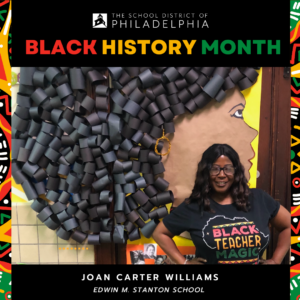 students but exemplifying it daily through her unparalleled teaching. EM Stanton’s passion for the arts mirrors Mrs. Williams’ zeal, and her initiative to establish and lead the annual Black History Show has been nothing short of transformative. This event has blossomed into a vibrant celebration of Black culture and heritage, thanks to her tireless efforts and innovative vision. Her adept coordination has allowed our students to delve into the richness of Black history, showcasing an array of talents that pay tribute to Black musicians and artists. From the stirring renditions of “Lift Every Voice and Sing” to the robust beats of African drumming, each show is a mosaic of Black artistic excellence, with this year’s choreography to Jon Batiste’s “Freedom” promising to be another memorable highlight.
students but exemplifying it daily through her unparalleled teaching. EM Stanton’s passion for the arts mirrors Mrs. Williams’ zeal, and her initiative to establish and lead the annual Black History Show has been nothing short of transformative. This event has blossomed into a vibrant celebration of Black culture and heritage, thanks to her tireless efforts and innovative vision. Her adept coordination has allowed our students to delve into the richness of Black history, showcasing an array of talents that pay tribute to Black musicians and artists. From the stirring renditions of “Lift Every Voice and Sing” to the robust beats of African drumming, each show is a mosaic of Black artistic excellence, with this year’s choreography to Jon Batiste’s “Freedom” promising to be another memorable highlight.
Moreover, Mrs. Williams’ commitment extends beyond the stage, as she champions the recognition of Black historical figures through her students’ meticulous Black History Month projects. She ensures that these educational explorations are not confined to February but are woven into the fabric of her lessons throughout the year. Her classroom is a space of accountability and celebration, where every student’s achievements are amplified.
Mrs. Williams, you are a pillar of EM Stanton, a beacon of educational brilliance, and a tireless advocate for cultural appreciation. Your contributions are invaluable, and during this Black History Month, we celebrate you with immense gratitude and admiration.
- Share a little about you (how long you’ve been in the District, other schools/ positions, why you went into education): I have been in the district for 22 years and have taught 3rd grade, 4th grade, and middle school science. I went into teaching because I felt a strong need to help students develop their literacy skills, especially in underserved neighborhoods.
- What are the joys of being a Black/African American classroom teacher in the District? Making sure that all students are exposed to and celebrate the contributions of Black people in history. Facilitating an exchange of cultures in the classroom year-round and ensuring that all voices matter and are heard.
- What are the challenges you’ve overcome as an African American teacher in the District? Making sure that African American students see themselves in all content areas (math, science, history, etc.)
- How do you honor your heritage and culture inside or outside of work? When I came to Stanton 17 years ago, there was a majority Black student population and no Black History program. I worked to create and facilitate a short Black History show that first year that was very well received by the entire community. That show has grown into one of the major events at our school. The performances in the Black History Show demonstrate the richness of Black culture through the arts. This is experienced in my classroom year-round, but truly highlighted in the Black History show. I work to connect students to Black voices in music, literature, visual art, and dance. We can make connections between current events and events in history to help students create a sense of pride in their school and community. My love of jazz helped me to create an amazing partnership with the Philadelphia Clef Club of Jazz where we put on the Black History for many years.
- What is your favorite thing about your culture/heritage? There is such a rich tradition that I embody and share with my class, colleagues, and community.
- Anything else you want to add? Our Black History Show this year will be at the Academy at Palumbo on February 29th at 6pm. Please join us!
Mrs. Williams, thank you for being the embodiment of what it means to be a truly remarkable educator and exemplar of African American culture.
Ismael Jimenez, Director of Social Studies
Mr. Jimenez has been with the District for 15 years and is the first Director of Social Studies that the Office of Curriculum has had in nearly a decade. He previously served 12 years as an African American 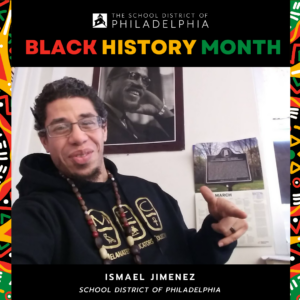 History educator for 12 years as a classroom teacher, both at Germantown High School and Kensington CAPA. His passion for learning was ignited when he himself experienced discrimination as a fourth grader in the education system and he saw an opportunity to use what he went through to improve the experience for generations to come. His decision to teach high school was “fueled by a deep-seated belief that education could serve as a means to authentically address injustice and advocate for equitable opportunities for all students.”
History educator for 12 years as a classroom teacher, both at Germantown High School and Kensington CAPA. His passion for learning was ignited when he himself experienced discrimination as a fourth grader in the education system and he saw an opportunity to use what he went through to improve the experience for generations to come. His decision to teach high school was “fueled by a deep-seated belief that education could serve as a means to authentically address injustice and advocate for equitable opportunities for all students.”
- Why is African American History so important to have for all of our students? African American history is crucial for all students as it provides a comprehensive understanding of the nation’s past, highlighting the contributions, struggles, and resilience of African Americans. Ultimately, studying African American history is essential for promoting social justice, combating systemic inequality, and cultivating informed and empowered citizens who can actively engage in creating a more equitable future.
- How do you honor your heritage and culture inside or outside of work? I celebrate Black culture and heritage inside work by surrounding myself in my work space with various ancestors that inspire my commitment to education. I also uplift the use of pedagogical theory rooted in African-centered educational models. Outside of work, I participate in several community based organizations connected to the intellectual genealogy of the radical Black tradition.
- What is your favorite thing about your culture/heritage? It provides purpose rooted in justice for all people outside and counter to the mythology of this society.
Mr. Jimenez has invested in the deep and critical work of expanding our city and District’s knowledge and consciousness of the power that Black and African American people have always held, while also advocating for the resources that enable Black and African American communities to truly thrive. Congratulations to Mr. Jimenez! Your contributions are invaluable, and during this Black History Month, we celebrate you with immense gratitude and admiration.
William W. Sax, M.Ed., African-American History and Social Studies Teacher
William Sax has taught in the School District of Philadelphia for over eighteen years, including the last five years at South Philadelphia High School. He graduated from the University of Pittsburgh with three bachelor’s degrees in Social Studies, African-American Studies, Secondary Education, and a Masters a in Rehabilitation Counseling — and completed his bachelor’s in three years and a two-year master’s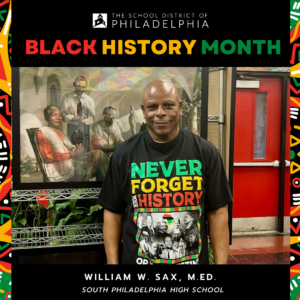 degree in one year while playing Football, Wrestling and Track at The University of Pittsburgh. He entered the field of education because he wanted to improve the lives of children.
degree in one year while playing Football, Wrestling and Track at The University of Pittsburgh. He entered the field of education because he wanted to improve the lives of children.
Mr. Sax, previously worked at Martin Luther School, and McDaniels Elementary School. He created the only African American museum in the District at South Philadelphia High School.
- What did you enter education? As a young man, I saw many of my neighbors with no hopes or dreams to succeed anywhere outside their community. There was no one who looked like us; everyone told us that black people never did anything in life, never invented anything, never wrote anything, never did anything productive except entering the country as a slave. I want to educate everyone about African-American History and all the great accomplishments that we have achieved in this world.
- What are the joys of teaching social studies and African American History in the District? To allow students to experience of the joy, pride and self-respect that they and their forefathers were the building blocks of all countries’ civilizations in the world in the areas medicine, astrology, mathematics, and philosophy, just to name of few.
- Why did you want to bring this museum to District students? As a classroom teacher, I created a museum that reflects and represents the great possibilities for my students’ lives and future; I can connect my classroom instruction and curriculum strategies directly with the artifacts in the museum. Additionally, many students come from poor communities, and cannot afford to visit museums, not even here in Philadelphia. This is an opportunity that allows students to actually just walk through the museum and see at least some of their history.
- How do you honor your heritage and culture inside or outside of work? I continuously research YouTube, books, and attend cultural events on the weekends and throughout the summer to find out new information that I can bring back to all of my students. Every Tuesday night on Google Meet, we discuss cultural events and things happening in the black community, and it’s open to everyone.
Congratulations to Mr. Sax! Your contributions are invaluable, and during this Black History Month, we celebrate you with immense gratitude and admiration.
Sheila Fisher, Dance Teacher
Congratulations to Sheila Fisher, an Exemplar of Excellence in Dance Education. It is with immense pride that we honor Ms. Sheila Fisher during Black History Month, a dance teacher whose dedication and passion for the art have left an incredible mark on the Lamberton School community. For over 14 years, Ms. Fisher has been the mastermind behind awe-inspiring assemblies and programs that not only entertain but educate, celebrating the essence of Black Joy, History, and Heritage at Lamberton. Her commitment to creating such vibrant and enriching experiences is unmatched, as evidenced by the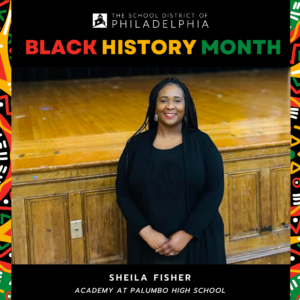 incredible celebrations that have become a cornerstone of the school community, particularly during Black History Month. Even when faced with the challenge of a virtual platform, Ms. Fisher’s ingenuity shone through, orchestrating a performance that was nothing short of beautiful. Although Ms. Fisher may no longer grace the halls of Lamberton with her presence as she now serves as a dance teacher at Academy at Palumbo High School, the absence of her spirit, joy, and talent is deeply felt. There’s solace in knowing that she continues to spread her infectious effervescence and unwavering commitment to the art of dance in another school community, fostering an appreciation for beautiful movement and the rich tapestry of Black heritage.
incredible celebrations that have become a cornerstone of the school community, particularly during Black History Month. Even when faced with the challenge of a virtual platform, Ms. Fisher’s ingenuity shone through, orchestrating a performance that was nothing short of beautiful. Although Ms. Fisher may no longer grace the halls of Lamberton with her presence as she now serves as a dance teacher at Academy at Palumbo High School, the absence of her spirit, joy, and talent is deeply felt. There’s solace in knowing that she continues to spread her infectious effervescence and unwavering commitment to the art of dance in another school community, fostering an appreciation for beautiful movement and the rich tapestry of Black heritage.
- Share a little about you (how long you’ve been in the District, other schools/ positions, why you went into education): I am a proud product of the School District of Philadelphia. I attended Robert E. Lamberton School from kindergarten through 12th grade. Never in a million years did I imagine that I would return to teach at my childhood alma mater. After graduating from Lincoln University, (the first historically Black college), I pursued my Masters degree in Education. I excitedly entered my teaching career. Currently, I have 19 years of teaching experience in total. Twelve of those years were spent teaching dance and theater at Lamberton. It was such a blessing to be afforded the opportunity to give back to my childhood community. Teaching at Lamberton did not feel like a “job”. It meant so much more, because I could see myself in my students. I remembered very well being a young African-American Philly girl, sitting in those same seats. I remember loving the arts, (dance, singing and theater). However, at that time there weren’t many opportunities to explore the arts in public schools, and my parents could not afford to pay for outside training.
- What are the joys of being a Black/African American classroom teacher in the District? I was so grateful for community centers and church communities for providing quality arts programs for kids like me. I later pursued professional dance training in my late teens and early twenties. Here I am today thriving in my dream career. My journey inspired me to give above and beyond for my students. Most of my students were African-American, and many students came from low-income homes. I wanted them to have the very best opportunities in the arts, even if it meant paying for needs out of my own pocket. While teaching at Lamberton, I was honored to receive the Lindback Award (2022). Recently, I transitioned to teaching dance at the distinguished Academy at Palumbo High School in South Philadelphia. I have fallen in love with the community already! My mission to build a quality dance program is well on its way to success.
- What are the challenges you’ve overcome as an African American teacher in the District? Being a black teacher in the district has been a joy. I love building relationships with all of my students of every race and culture. However, having the opportunity to serve as a role model specifically for my African-American students has been a priceless reward. I believe that Black teacher representation in classrooms provides a much-needed source of encouragement and pride for African American students. Black teacher representation in classrooms also allows students of other races an opportunity to experience Black culture in a positive and meaningful way.
- How do you honor your heritage and culture inside or outside of work? I honor my heritage and culture every day by being intentional about my purpose and my mission in life. To me, being a dance teacher in the district is two-fold. First, my mission is to provide quality dance instruction for students whose families may not be able to afford dance school. I believe that a lack of money shouldn’t prohibit children from having access to quality arts. Second and equally important, I teach dance with the purpose of building character, confidence and self-worth in my students. We purposefully explore history, new perspectives, emotions, compassion, self-love and love for others through music and movement.In addition, I honor my heritage and culture by organizing annual school-wide Black History programs. While teaching at Robert E. Lamberton Elementary School, I directed and produced quality Black History productions for 12 years. This year, I am honored to continue the tradition by co-directing the Black History production at my new school, Academy at Palumbo High School. I feel a great sense of responsibility to educate our youth about Black History and to also celebrate the accomplishments of African-American people.
- What is your favorite thing about your culture/heritage? My favorite thing about my culture is our story of resilience. I am so grateful to my ancestors for providing me with such rich, brilliant and beautiful culture. Yet, beyond the beauty of our hair, beyond the richness of our skin, and beyond the brilliance of our creative minds, lies our true super power. Resilience! It is a gift passed down through generations. A gift that keeps us rising. A gift that will empower my people for generations to come. I am so proud to be Black, and I’m even more proud to be a Black teacher.
LeRoy Hall, Jr., Principal
Principal Hall has served 10 years as the school principal of Henry H. Houston Elementary School. During the first year of his principalship at Houston, Principal Hall established Harambee to help cultivate a sense of unity and inclusivity among students of all ages. During this K-8 celebration, students are honored for a variety of achievements. Students engage in traditional practices such as call and response and sing “Lift Every Voice and Sing”. There is also a lesson that is taught through a traditional folktale, read aloud, or video. 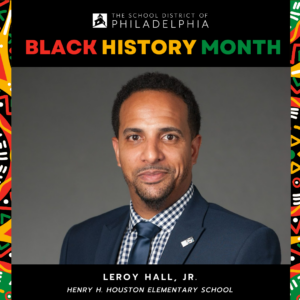
Through Harambee, the school celebrates its core values, while also promoting interaction and understanding across various age groups, fostering a supportive and inclusive school community and encouraging collaboration, appreciation for history, and a culture of respect that extends throughout the entire school environment.
- Why did you enter education? Education opened the door for me as I was a child who grew up in an impoverished situation. As a result, I have dedicated my life to helping as many people as possible to use education to open the door for them, regardless of their economic background.
- Why is Black History Month so important to you? Although Black history is made 365 days a year, Black History Month is important because it creates a platform to focus on the many contributions of African Americans and individuals from the African diaspora. Black History Month is important for several reasons, especially for a black male principal. It provides an opportunity to celebrate and recognize black individuals’ achievements, contributions, and resilience throughout history. Additionally, highlighting black history helps to inspire and empower Black students, providing them with positive role models and a sense of pride in their heritage while simultaneously providing an example of perseverance and accomplishment for all students. It also fosters essential conversations about social justice, equity, and the ongoing fight against racism.
- How do you honor your heritage and culture inside or outside of work? As a school principal, I make it a priority to honor my heritage and culture both inside and outside of work in various ways. One way is integrating diverse perspectives and contributions from my heritage and culture into the school community. Additionally, I organize and participate in cultural events and celebrations within the school community. Leading by example, I openly embrace my heritage and culture, whether wearing traditional clothing, sharing personal stories, or participating in cultural activities. Advocating for diversity and inclusion initiatives within the school, such as multicultural clubs, diversity training for staff, and inclusive policies, is another important aspect of my commitment to honoring my heritage and culture. Finally, providing mentorship and support to students from similar backgrounds, offering guidance, encouragement, and resources to help them succeed academically and personally, allows me to contribute positively to the school community while staying connected to my roots, providing a positive role model of color for students that do not have the same background as me is equally as vital as it shatters the societal narrative about Black males and their ability to lead.
- Anything else you want to add? I am incredibly proud of how the School District of Philadelphia embraces, celebrates, and supports the diversity that makes our schools and communities great!
Congratulations to Principal Hall! Your contributions are invaluable, and during this Black History Month, we celebrate you with immense gratitude and admiration.
